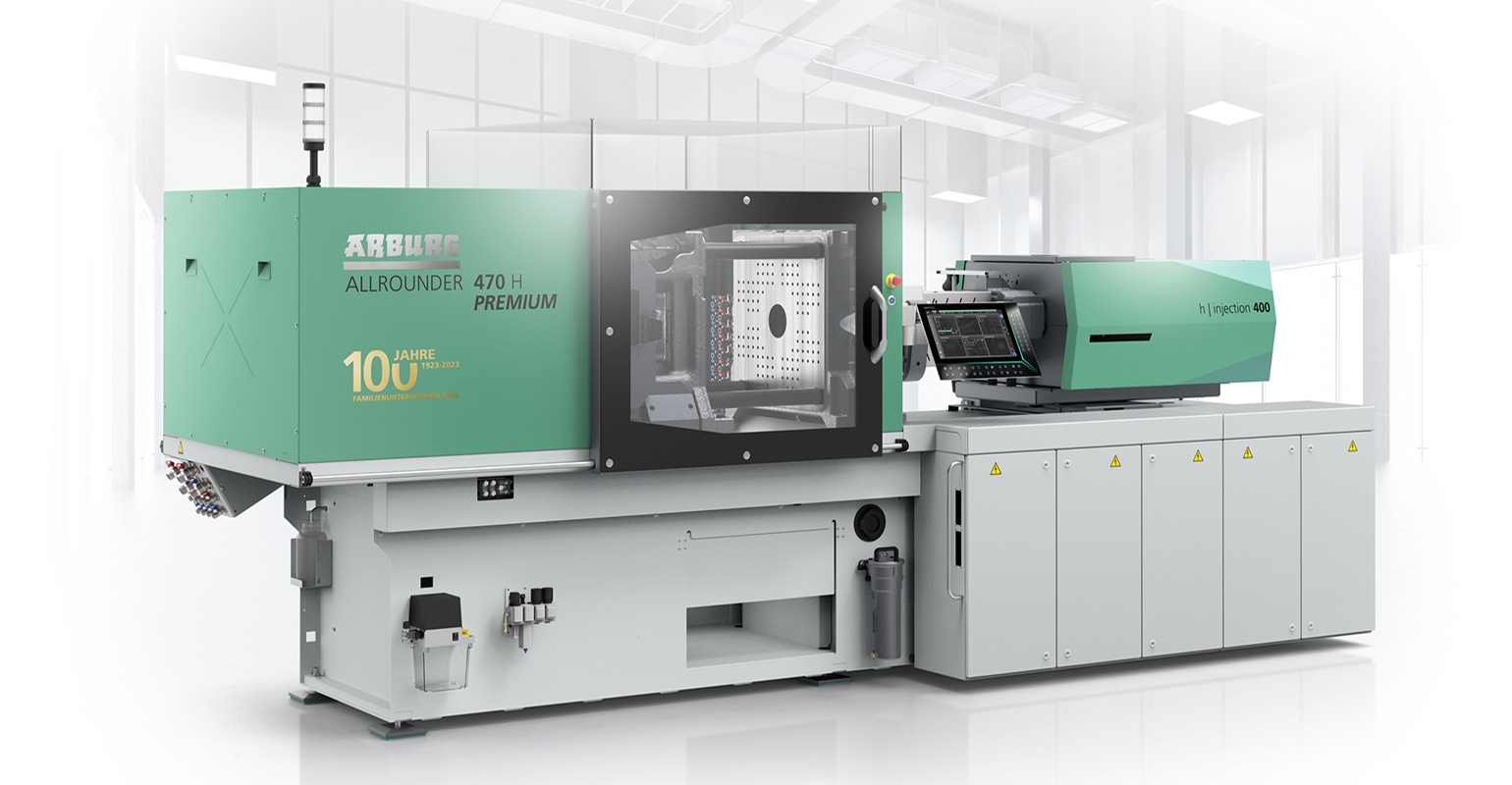
Arburg Marks 100-Year Anniversary with New Hybrid Allrounder 470 H Models

The colossus of Lossburg, Arburg is celebrating its 100-year anniversary in fitting fashion with the introduction of new models in its hybrid Allrounder 470 H plastic injection molding machine portfolio. Available in Comfort, Premium, and Ultimate versions, the presses have been designed with an eye toward reduced acquisition and operating costs, energy efficiency, and overall sustainability. It marks the start of a new generation of machines, said Arburg.
The hybrid machine features a new patent-pending oil management system and flow splitting that enables the simultaneous movements of hydraulic secondary axes and extended use of the servo hydraulic system.
Energy consumption reduced by up to 50%
Compared with similar hydraulic machines, the Allrounder 470 H consumes up to 50% less energy and, depending on the application, can save up to 12,000 kilograms of CO2 annually, according to Arburg. The new oil management system also helps to conserve resources, as approximately 35% less oil is needed and waste machine heat is used to pre-heat the oil. Required cooling water capacity is between 50 and 70% lower than competing machines and dry cycle time has been reduced by up to 33%.
Arburg said it took into account advice from customers and service personnel in making the machine more user-friendly and reliable. The integration of predictive maintenance technology is one example.
Arburg’s servo hydraulic system (ASH), a proven technology in its hydraulic and electric Allrounders, is integrated in the Allrounder 470 H Comfort and Premium models. ASH enables energy-efficient and low-emission operation, as the speed-controlled, water-cooled servo motor continuously adjusts the drive system to the actual power requirement. When the machine stops moving, for example, the pump drive also stops, eliminating idling loss. The energy saving can be as much as 50%, especially in processes with long cooling times, said Arburg.
Flow-rate splitting positively affects productivity, energy efficiency
Splitting the flow rate of the hydraulic pump makes it possible to drive an additional secondary axis at the same time. This technology has a positive effect on productivity and energy efficiency, as the machines consume less energy overall while cycle times are reduced.
The new oil management concept encompasses an improved oil container, differential pressure-enabled oil filter housing, and predictive maintenance for filter changes and oil pump inspection, thus preventing downtime. The filter housing has been designed for easy access. The new oil management concept also reduces energy and cooling water consumption and increases the service life of the individual components, according to Arburg.
More user-friendly features
Machine designers also spent considerable time intergrating user-friendly features, said Arburg. A real-time Ethernet bus has replaced the individual ribbon cables of the control modules, increasing service life, and hardware distribution on and in the machine base has been completely revamped. The control manifold and hydraulic accumulator have been moved inside, leaving more space for peripheral equipment at the rear of the machine. The electrical, hydraulic, and water media circuits have been separated, which simplifies assembly, service, and conversion. Hydraulic and water circuits are located in the machine base. The pneumatic and central lubrication systems are on the operating side, which also means more flexibility with options on the rear side.
The Comfort and Premium models of the 470 H will have their world premiere this month as part of an anniversary celebration at the company’s headquarters in Lossburg, Germany. They will also be on display during the Anniversary Days event on March 8 to 11 and will be featured at various trade shows throughout the year.
Arburg was founded in 1923 by Arthur Hehl, who began manufacturing surgical instruments in the cellar of his home. In 1954, his son Karl developed a small injection molding machine to produce plastic components for a product he was making. Arburg’s signature Allrounder injection molding machine was developed in 1961, and the rest, as they say, is history. The company is still owned by the Hehl family.

Leave a Reply